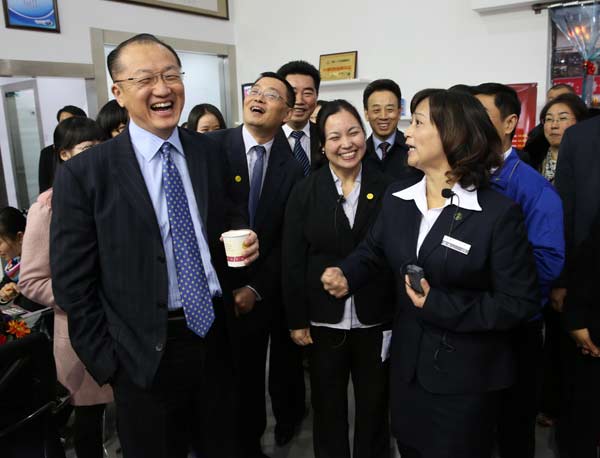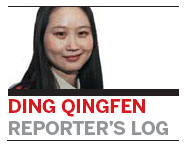China offers example in anti-poverty campaign
Updated: 2012-12-05 10:07
By Ding Qingfen (China Daily)
|
||||||||
On his first official visit to China, World Bank President Jim Yong Kim talks about the launch of a development knowledge hub, as Ding Qingfen reports.
Jim Yong Kim has a strong affinity and affection for China.
On what is his first official visit to the country as the newly appointed president of the World Bank Group, the South Korean physician and anthropologist says he has a passion for the country, which he remembers starting as early as his childhood.
|
 |
|
World Bank President Jim Yong Kim (left) speaks with the members of business community in Sichuan province about business development and charity. Wu Zhiyi / China Daily |
His mother was a philosopher and studied Chinese, traveling in the country often while writing on Chu Hsi - the Confucian scholar of the Song Dynasty (960-1279) and China's most influential rationalist Neo-Confucian.
And now his own 12-yearold son is also studying Chinese.
"The Korean people, in many ways, feel so close to China as there are many fundamental Chinese cultures that are similar to those in Korea. In South Korea, we still use Chinese characters," said Kim.
"I really think this closeness with China, and (my) family's enthusiasm for China, will be helpful in drawing the World Bank and China closer," he added.
Kim became the 12th president of the World Bank in July this year, after serving as president of Dartmouth College, a pre-eminent center of higher education that consistently ranks among the top academic institutions in the United States.
During four busy days in Beijing, Kim met officials from various government departments and organizations, aiming to cement the World Bank's relationship with China.
"China is very, very important for us. My meetings in Beijing and my travels during the past few days have demonstrated that we share a common passion - to do our very best to work toward ending poverty and building shared prosperity," he said.
China is the second major emerging market that Kim has visited in his six months in charge of the bank, following a trip to South Africa.
Topping his agenda while here was announcing the formation of the World Bank-China Knowledge Hub for Development, which will facilitate cooperation between Chinese and international experts aimed at spreading practical knowledge from China's successes in reducing poverty both within China as well as to other countries.
"The hub will play an important role, by making China's lessons available to the world," said Kim.
Kicking off that cooperation, he and Vice-Premier Li Keqiang have agreed to carry out a special report on China's rapid urbanization process, in a bid to help the country better implement and advance the process, as well as using the experiences to educate other economies going through similar processes.
 |
| World Bank president shows his caring side |
Managing urbanization is a priority for China, with about 75 percent of its GDP generated in the largest 120 cities, and 350 million rural residents expected to move into cities over the next 20 years. That means about 14 million more urban residents each year.
Kim said China's urbanization strategy is clearly very well advanced.
But "what we would like to do is to simply help China to collect the experiences. At the same time, from all over the world, we are going to collect the experiences of urbanization that we think have been successful".
He added the planned document will not just be for China, but also for other countries.
The report, however, is far from the first time the two sides have worked together.
The bank has been supporting projects - through loans and knowledge transfer - in China for many years, and the "partnership has remained strong", added Kim.
Related readings

 Relief reaches isolated village
Relief reaches isolated village
 Rainfall poses new threats to quake-hit region
Rainfall poses new threats to quake-hit region
 Funerals begin for Boston bombing victims
Funerals begin for Boston bombing victims
 Quake takeaway from China's Air Force
Quake takeaway from China's Air Force
 Obama celebrates young inventors at science fair
Obama celebrates young inventors at science fair
 Earth Day marked around the world
Earth Day marked around the world
 Volunteer team helping students find sense of normalcy
Volunteer team helping students find sense of normalcy
 Ethnic groups quick to join rescue efforts
Ethnic groups quick to join rescue efforts
Most Viewed
Editor's Picks

|

|

|

|

|

|
Today's Top News
Health new priority for quake zone
Xi meets US top military officer
Japan's boats driven out of Diaoyu
China mulls online shopping legislation
Bird flu death toll rises to 22
Putin appoints new ambassador to China
Japanese ships blocked from Diaoyu Islands
Inspired by Guan, more Chinese pick up golf
US Weekly

|

|







